Julia (3)
Julia (39 BCE - 14 CE): daughter of Scribonia and Octavian, the future emperor Augustus.
Politics
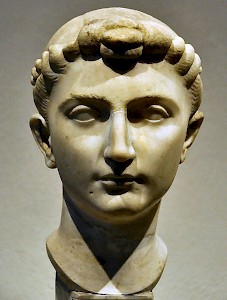
Julia, the daughter of Octavian, was born in the autumn of 39. By then, her father had embarked upon a spectacularly ruthless career as a politician. Mark Antony had refused to share the inheritance of Julius Caesar with the nineteen year old Octavian, so he had sided with the Senate, had received an army, had defeated Antony in the winter of 44/43, had marched on Rome, obtained the consulship, and had joined Antony and Lepidus in the Second Triumvirate (November 43). In October 42, Antony and Octavian had defeated the murderers of Caesar in the battle of Philippi, and Octavian had returned to Italy.
It had by now become increasingly clear that the next round of civil wars was to be fought between Antony and Octavian. In 41, Mark Antony's brother Lucius had seized the initiative, but Octavian had defeated him at Perugia, and had offered mild terms. This had damaged the relations between the two triumvirs, but a personal treaty had been concluded. (The fact that Lepidus was not even asked for advice, illustrates how much power he had lost.)
Meanwhile, Octavian had married Scribonia. On the day of Julia's birth in the autumn of 39, however, the marriage was dissolved, and a couple of months later, Octavian married Livia.
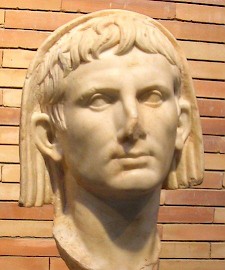
Octavian's career progressed slowly but steadily. His main concern was Sextus Pompeius, a senator turned pirate, who threatened the flood supply of Rome from Sicily. In 37, Octavian's friends Maecenas and Agrippa were able to strike a bargain with Mark Antony, who would send a fleet to the west to fight against Pompeius, while Octavian would sent an army for a campaign against the Parthian Empire. The deal was concluded with an engagement: Antony's son Antyllus was to marry Julia, who was now two years old.
The engagement never led to a marriage. Civil war was inevitable. In 31, the two politicians fought a naval battle near Actium in Greece. Octavian and Agrippa defeated Antony and his wife, queen Cleopatra VII of Egypt. In Alexandria, the ill-fated couple committed suicide, and Octavian became sole ruler of the Roman empire. In 27, he adopted the honorific name Augustus.
First Marriage: Marcellus
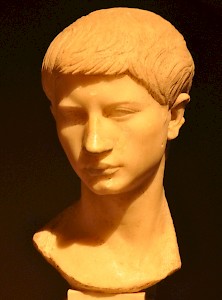
In 25, Julia married for the first time, to Marcus Claudius Marcellus, the son of Augustus' sister Octavia and another Marcus Claudius Marcellus (consul in 50). Julia's father was not present: he was fighting a war in Spain and had fallen ill. Agrippa presided over the ceremony.
There were rumors that Marcellus had been chosen as Augustus' successor, and in the next year, the young man was designated to occupy the office of aedile, which was a bit irregular (he should have been quaestor first) and too soon for someone who was only eighteen. As an aedile in 23, Marcellus organized splendid games - sponsored by the emperor himself - but Julia's husband died in September 23. He was the first to be buried in the Mausoleum of Augustus.
Second Marriage: Agrippa
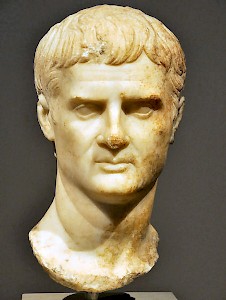
In 21, Julia remarried, and again it was a political marriage: her new husband was no other than Agrippa, Augustus' personal friend, who had divorced his wife Marcella to marry the princess. The newly-weds appear to have lived in a villa in Rome that has been excavated near the modern Farnesina in Trastevere, close to the river Tiber. Agrippa and Julia were to have five children.
From June 20 to the spring of 18, Agrippa was governor of Gaul, and it is likely that Julia followed him to the country on the other side of the Alps. Shortly after their arrival, their son Gaius was born, and in 19, Julia gave birth to a daughter who was called Vipsania Julia. After their return to Italy, a third child followed: a son named Lucius.

The emperor adopted the two boys as his own children, which in fact meant that he chose Agrippa and his sons as his successor. Because this move could estrange Augustus' stepson Tiberius (son of his wife Livia), he was compensated with a marriage to a girl named Vipsania Agrippina, daughter of Agrippa and stepdaughter of Julia. At the same time, another stepdaughter of Julia was married to Publius Quinctilius Varus, a "new man" in the Augustan aristocracy and a close friend of Tiberius. Although Augustus by now may have preferred the line of Julia and Agrippa, he did not want to offend Tiberius.
In the spring of 16, Agrippa and Julia started a tour through the eastern provinces, where they visited (among other people) the king of Judaea, Herod. In October 14, the couple was in Athens, where Julia gave birth to her fourth child, a girl that was called Agrippina. After the winter, the family returned to Italy. Julia was pregnant again when her husband died in March 12. He was buried in the Mausoleum of Augustus. Immediately after Agrippa's posthumous son Agrippa Postumus was born, Julia again remarried: to Tiberius.
Third Marriage: Tiberius
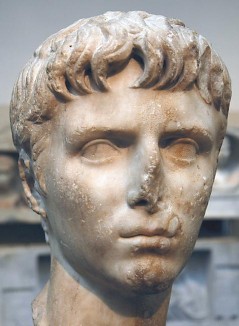
It was probably not a very happy marriage: Augustus had forced two people to marry who would never have married if they'd had free choice. Julia and Agrippa had been a happy couple and she was still mourning her late husband; and there is no reason to doubt that Tiberius had liked his wife too. However, the emperor had good reasons for his decision. He had always wanted Agrippa and his grandsons to succeed him, but now that Agrippa was dead, another man needed to be found as intended successor until Gaius and Lucius were old enough. So, Tiberius - clearly the most capable man in the Roman world - had to be linked closer to Augustus and the two boys, and had to marry with Julia.
They had one son, in 10, but he died within a couple of days after he was born. In the next years, Tiberius was in Germania, and this time, Julia did not follow her husband: she remained in northern Italy. Still, she joined Tiberius' mother (and her own stepmother) Livia in entertaining the wives of the senators when her husband celebrated a minor triumph.
Gaius
Meanwhile, Augustus started to believe that he could be succeeded directly by Julia's son Gaius. In 5, the boy was elected consul by the People's Assembly. Augustus postponed the actual tenure until Gaius was about twenty years old, but Tiberius interprered the fact that Augustus had not completely forbidden it as a sign that he did not have the full confidence of his father-in-law. It is likely that Julia played a role: she never forgot that she was Augustus' daughter and had always been a member of the world of the monarchy, whereas Tiberius remained, deep in his heart, a republican. Julia took her father's position for granted, Tiberius merely accepted it as a necessity. Another point of difference was that Tiberius had a son of his own, and might be tempted to ignore Gaius and Lucius.
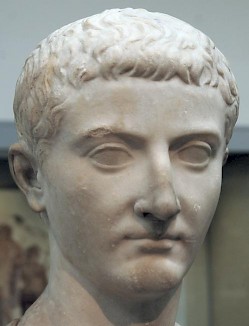
It is possible that Augustus learned from his daughter that Tiberius would not be the perfect successor, and therefore did not forbid the election of Gaius, but merely postponed it. Whatever the reason, the two men quarreled and Tiberius went into voluntary exile to Rhodes.
Scandal
Gaius would come of age in 1 BCE, but one year before, a strange scandal led to the disgrace of his mother. Julia was banished and several men were executed, forced to commit suicide, or exiled. It is hard to reconstruct what actually happened, but it was proved that she had taken part in nightly drinking parties on the Roman Forum and that she had a lover named Iullus Antonius. Other men were also reported to have enjoyed her favors, but this may be gossip.
Probably, this is all there is to the story: Julia had a lover. She had been forced into a marriage that had been a disaster, had permitted herself an illicit pleasure, and had made a mistake that was fatal for a princess: she had not been discreet enough. On the other hand, it was said that Iullus Antonius had designs upon the monarchy, probably by marrying Julia before Gaius and Lucius had come of age. The fact that several men, all of the highest nobility, were executed, may indeed suggest that there was more than meets the eye. Unlike Tiberius, who was from a rather obscure family, and the two sons of Agrippa, who had belonged to an even lesser family, the condemned men were blue-blooded. This interpretation, however, forces us to assume that Julia would betray her own children, which is not very likely.
However this may be, Julia was sent into exile to the island of Pandateria, which is lying off Campania. This was harsh: the island, now called Ventotene, measures less than 1¾ km² and was almost uninhabited. Julia's mother Scribonia accompanied her.
The End
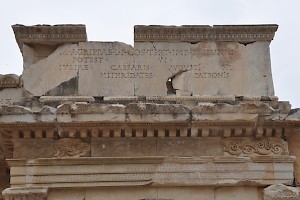
The career of Julia's son Gaius was short-lived. To learn something about government, he left Rome to make a tour through the eastern provinces. (Among the officers that escorted the him were the historian Velleius Paterculus, Marcus Lollius, Publius Sulpicius Quirinius, and Seianus, the future praetorian prefect.) Gaius visited his stepfather Tiberius, met the new Parthian king Phraataces, and invaded Armenia. Unfortunately, he died on his return to the west (3 CE). One year before, Lucius had already died.
Julia must have heard all this on her island, and her father showed some mercy: he allowed her to settle in Regium, in the "toe" of Italy. At last, she could receive some people.
Augustus was now forced to recognize Tiberius, the son of his wife Livia, as successor. This time, Tiberius had no rivals, because his stepson Agrippa Postumus had been sent into exile. His stepdaughter Vipsania Julia was charged with adultery and also sent into exile. When Tiberius succeeded Augustus in 14, he took no half measures: Postumus was executed and Julia was forced to commit suicide.
The only child of Julia that survived her mother was Agrippina, who married to Germanicus, the son of Tiberius' brother Germanicus. Agrippina was to die in exile too.